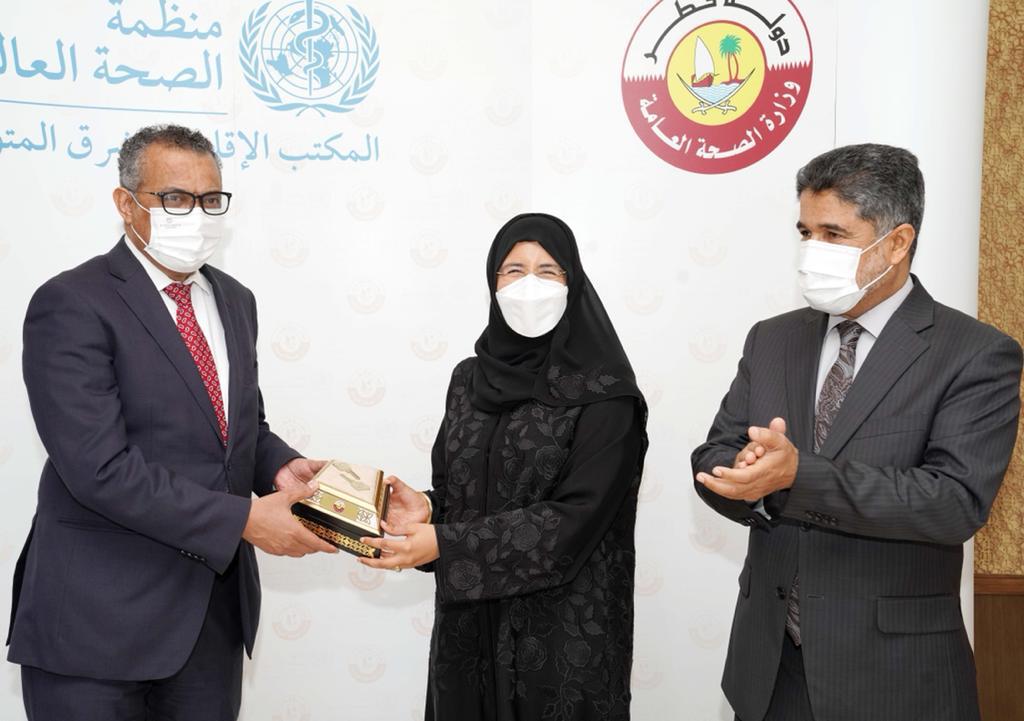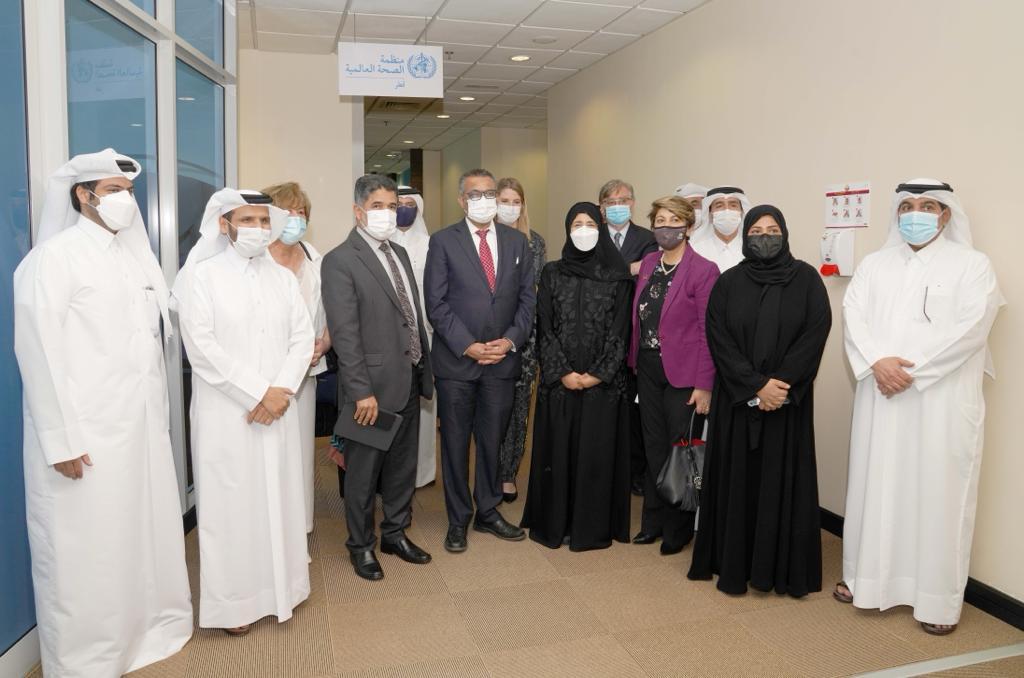 Dr Tedros Adhanom Ghebreyesus, WHO’s Director-General, H.E. Dr Hanan Mohammed Al-Kuwari, Minister of Public Health, and Dr Ahmed Al-Mandhari, WHO Regional Director for the Eastern Mediterranean
Dr Tedros Adhanom Ghebreyesus, WHO’s Director-General, H.E. Dr Hanan Mohammed Al-Kuwari, Minister of Public Health, and Dr Ahmed Al-Mandhari, WHO Regional Director for the Eastern Mediterranean
Doha, 30 March 2022 – H.E. Dr. Hanan Mohammed Al-Kuwari, Minister of Public Health, Dr Tedros Adhanom Ghebreyesus, WHO’s Director-General, and Dr Ahmed Al-Mandhari, WHO's Regional Director for the Eastern Mediterranean, today inaugurated a new WHO country office in Qatar to strengthen cooperation between Qatar and WHO, support the achievement of Qatar's national health goals and contribute to regional and global public health work.
The establishment of the new office will strengthen WHO's work with health authorities in Qatar and other partners such as United Nations agencies, humanitarian and development partners, nongovernmental organizations, WHO collaborating centres and the private sector.
H.E. Dr. Hanan Mohammed Al Kuwari stressed that the inauguration of the WHO Country Office in Qatar, will contribute to strengthening and supporting the strong partnership between Qatar and WHO, which aims primarily to improve the health and well-being of the population.
Her Excellency pointed to many joint projects between Qatar and the organization, most notably the distinguished cooperation in supporting aspects of health and safety during the FIFA Qatar World Cup 2022, to represent the tournament as a beacon for promoting physical and psychological health, and a model to ensure the establishment of major health and safe sporting events in the future.
H.E. The Minister of Public Health also praised WHO's outstanding role in responding to the world's unprecedented health challenges, and the strategic and technical support that the WHO provides to countries all over the world as well as promoting international cooperation "for a healthier world."
Qatar contributes significantly to supporting WHO initiatives, such as supporting “WHO’s Thirteenth General Programme of Work, 2019–2023”, as well as supporting the response to the COVID-19 pandemic, Access to COVID-19 Tools (ACT) Accelerator, and many WHO initiatives and programmes.
Dr Tedros Adhanom Ghebreyesus, WHO’s Director-General, said, “As a major humanitarian donor, Qatar has generously supported WHO's work, particularly in emergency response. At the same time, Qatar has achieved many health gains at home. Therefore, I am delighted to take part in the opening of the new WHO country office in Qatar, which will help further strengthen our close collaboration. The WHO country office will provide strategic, policy and technical support to assist Qatar in advancing health and well-being at national, regional and international levels.”
WHO's Regional Director for the Eastern Mediterranean Dr Ahmed Al Mandhari said, “We are keen to strengthen national and regional cooperation with the State of Qatar as a top priority for our work. With the inauguration of the WHO office today, we are taking an important step in strengthening the strategic partnership with the State of Qatar, which has been and continues to be a key partner in health in the regional and global arenas.”
He added: “Qatar has always played a strategic role as a Member State of WHO’s Eastern Mediterranean Region and I am confident that our partnership will move forward to broader horizons that will enable us to jointly promote health action in our Region and beyond through initiatives, programmes and policies that build on Qatar's development and health achievements, in line with our regional “Vision 2023: Health for by all: a call for solidarity and action”, and enable us to achieve the 2030 Sustainable Development Goals.”
Dr Rayana Bou Haka, Qatar Country Desk Officer and Country Cooperation Manager in the WHO Regional Office, said, “The inauguration of the WHO country office in Qatar is the culmination of a historic and fruitful partnership between WHO and the Ministry of Public Health and highlights the critical importance of close communication between states and governments in the work of WHO.”
“We eagerly look forward to working on the ground with national health authorities and to the contributions that the new office can make towards strengthening WHO's capacity for support through field-based programmatic interventions to strengthen health service delivery, share experiences, best practices and lessons learned at the local, regional and global levels, and work with other United Nations agencies, as well as ministries and government institutions,” she added.



